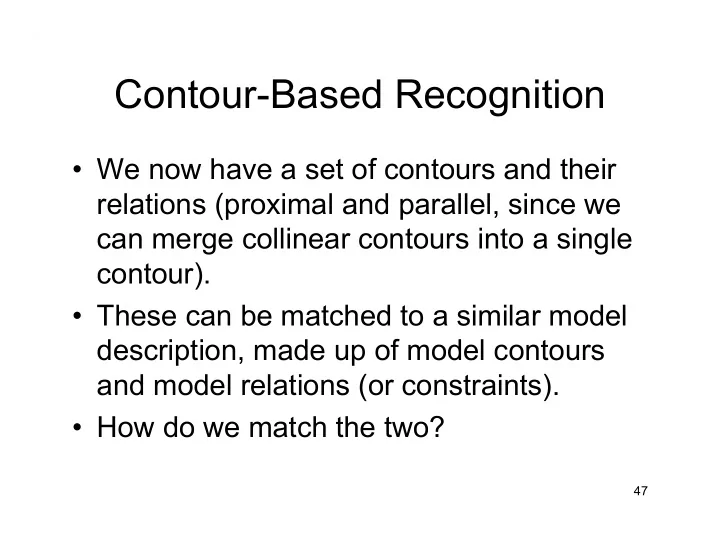

Contour-Based Recognition • We now have a set of contours and their relations (proximal and parallel, since we can merge collinear contours into a single contour). • These can be matched to a similar model description, made up of model contours and model relations (or constraints). • How do we match the two? 47
Interpretation Tree (IT) Search • Introduced by Grimson and Lozano-Perez (1984). • Equivalent to a constraint satisfaction problem (CSP), where model labels are assigned to image features subject to their satisfying model constraints. • Equivalent to a subgraph isomorphism problem, where an edge- and node-attributed model (sub)graph is matched to an image graph. 48
Example M1 I5 Model: Scene: I4 M2 I2 M6 M3 M4 I3 I1 M5 Proximity (cotermination) Parallelism Object boundary 49
Model: Scene: M1 I5 Example M2 I4 I2 M3 M6 M4 I1 I3 M5 M1 M2 M3 M4 M5 M6 I1 … … … … M2 M3 M4 M5 M6 M1 M2 M3 M4 M5 I2 M1 M2 M3 M5 M2 M3 M4 M6 M1 M3 M4 M5 I3 M2 M3 M4 M1 M2 M3 M3 M4 M5 I4 M1 M2 50 I5 M2 M3
Model: Scene: M1 I5 Spurious Features M2 I4 I2 M3 M6 M4 I1 I3 M5 M1 M2 M3 M4 M5 M6 WC I5 M1 M2 M3 M4 M5 M6 I2 • Spurious features need wildcard assignment. • Increases complexity of search significantly. 51
IT Epilogue • Like any search problem, efficiency can be gained through correct feature ordering, e.g., match most discriminative (least ambiguous) features first. • Nature of features and constraints dictates how categorical/exemplar the model is. • The stronger the features/constraints, the more aggressive the pruning, but the more brittle (exemplar-based) the model. 52
Recommend
More recommend